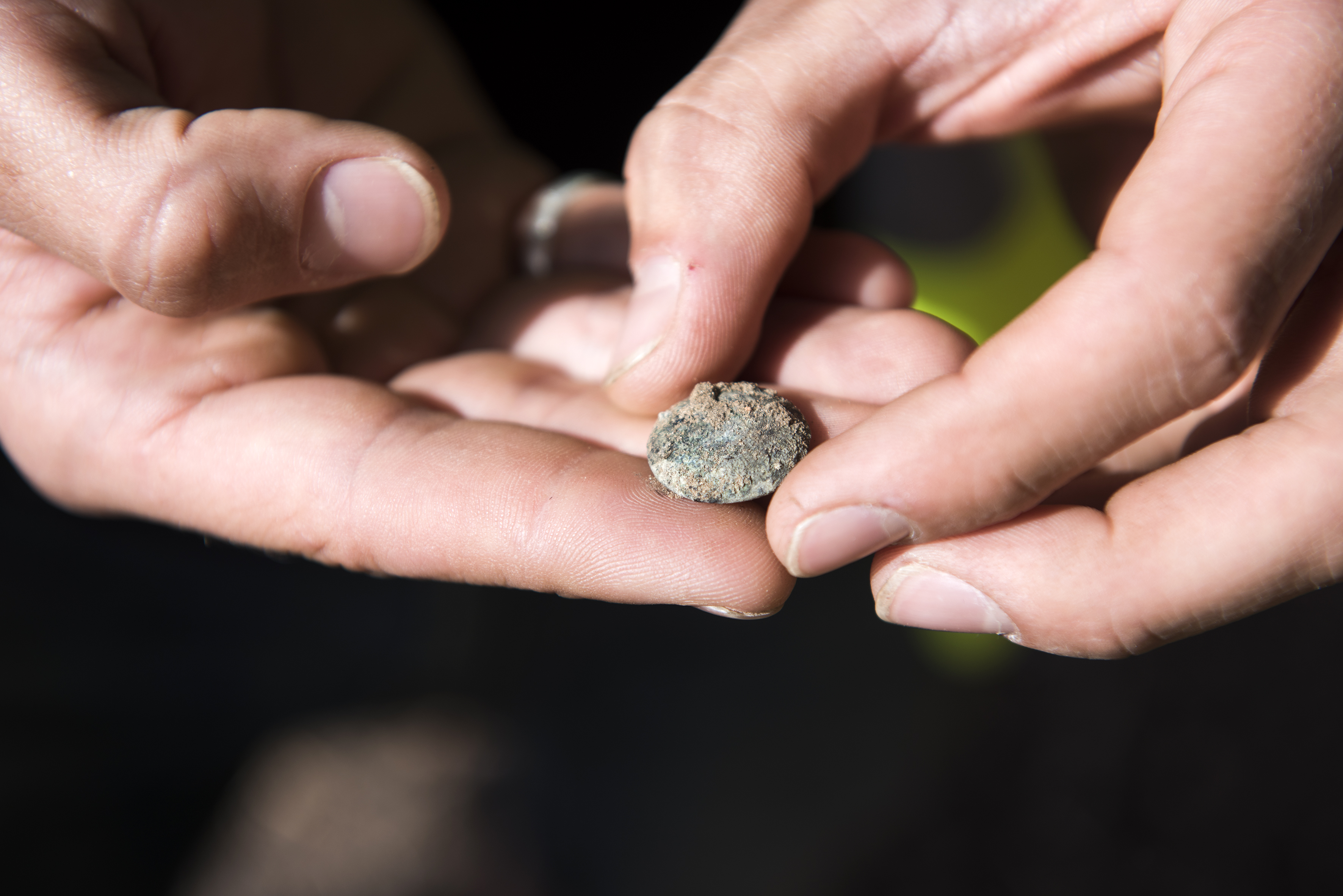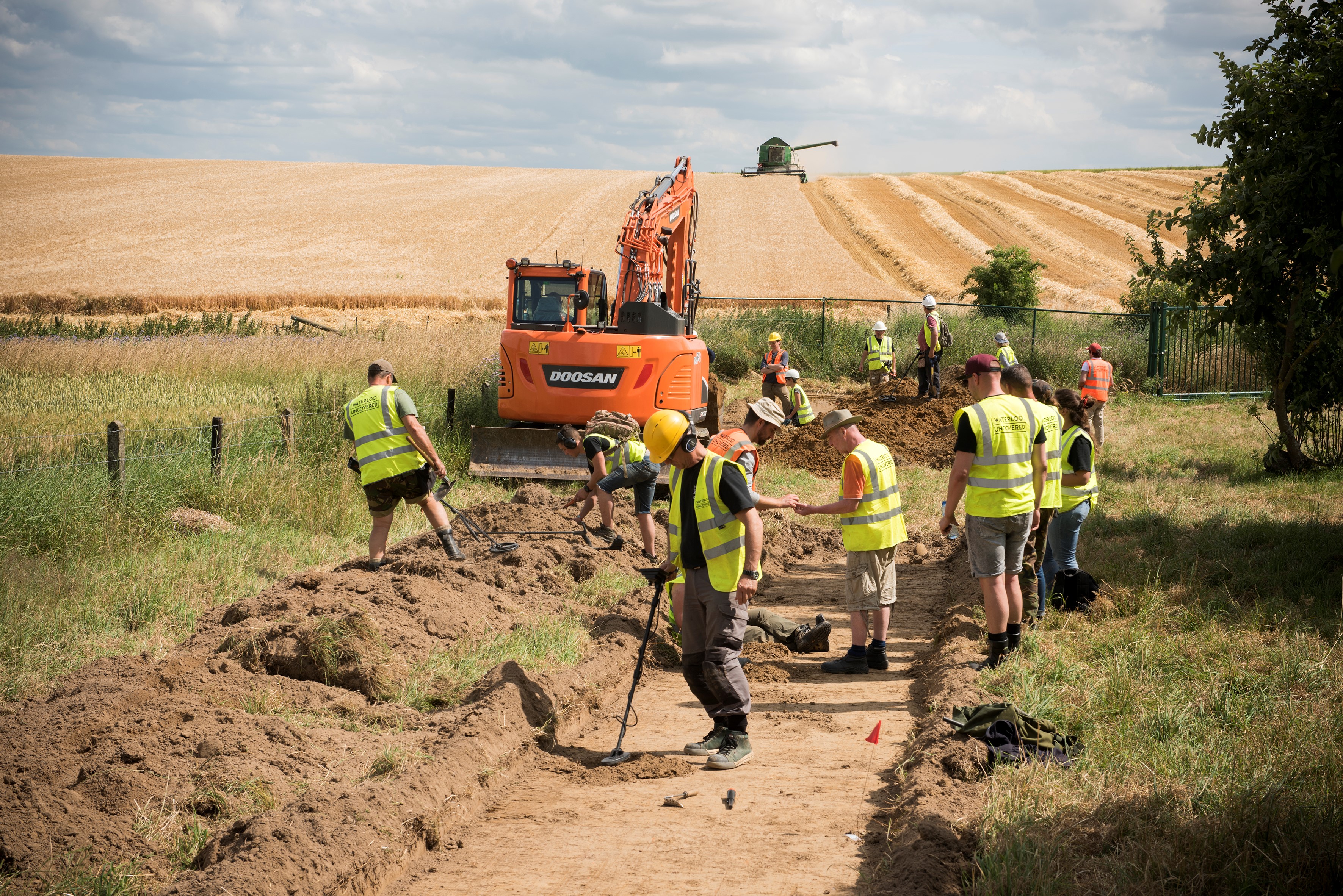Waterloo, Belgium – Oliver Horncastle couldn’t believe his luck. He dusted off a round metal piece from the spoils heap of archaeological excavation at Hougoumont Farm in early July, and there it was: the 8-pointed star and the cross of England. It was a regimental button of Britain’s Coldstream Guards, lost in the ground during the Battle of Waterloo on June 18, 1815. It would be a nice find for anyone, but for Horncastle, an active Guardsman, it was magic.
“It doesn’t really get any better than that, for a Coldstream Guard to find a Coldstream Guard button at Hougoumont Farm, next to the gate. It’s kind of a culmination of all the good things that could happen to a Guardsman on a dig like this,” he said.
Horncastle, 22, was taking part in the Waterloo Uncovered veterans’ excavation project, a charity organized to bring serving members and veterans together to ease adjustment to post-combat life. Waterloo Uncovered was founded in 2015 by two Coldstream veterans, Mark Evans and Charlie Foinette, after Evans’ service in Afghanistan left him devastated by PTSD. Foinette, a major in the Guards, has continued in active service. The charity’s first year saw about 20 British veterans and volunteers come together for two weeks in summer to dig on the Waterloo battlefield, under the direction of university archaeologists. The project has grown to more than 100 participants this year and includes veterans and volunteers from Belgium, The Netherlands, France—and even one American veteran.

Justin Li, a U.S. Army cavalry scout in Iraq in 2010-2011, said he was fascinated after reading a biography of Napoléon, and when he learned of Waterloo Uncovered’s program, he applied. He said the connection between past and present soldiering put some of the difficulties of his own service in perspective. “These men did that and more. To reconnect with the spirit of being a warrior, especially on this great field, is something that’s very special to me,” Li said.
Remarkably, the battlefield at Waterloo had not been excavated by archaeologists in its 200-year history. It was famously looted after the battle, and the lack of human remains found there has led archaeologists to believe the bones in mass graves were dug up and ground for fertilizer in the 19th century. An estimated 20,000 men died in the one-day battle, ranking it the third-bloodiest of Napoléon’s campaigns. But it was his last, and name of Waterloo has gone into history as a nickname for debacle.
The teams were working on three sites this year—Mont St. Jean, where the English troops’ field hospital was set up, Hougoumont Farm and Frichemont Farm. They have found hundreds of musket balls, the French distinguished from the English by their smaller size and weight, and various fragments of metal, some of which may be from the battle. Finds were labeled with the GPS coordinates of their location and set aside for careful examination. Participants noted that the teamwork was a joy for all of them, and particularly helpful to veterans with severe battle injuries.
Horncastle, recovering from surgery to his ankles, said he has appreciated being able to work with combat veterans. He will be joining his unit in Iraq next year. “Some people have had horrific accidents and horrific things happen to them. This project is doing them a huge amount of good, you can see it day on day, week on week. Some of these guys are coming out of their shells in ways they probably haven’t done in a great many years.”
And Hougoumont Farm was an iconic battle for the Coldstream Guards. There were about 3,000 English troops inside the farm under attack by more than 10,000 French, and at one point a squadron of French forced their way in via the north gate. A few Guardsmen managed to close the gate and block any further encroachment, an act that became the legendary turning of the course of battle.
“We started the project because, as Coldstreamers, this is hallowed ground,” said founder Charlie Foinette, who studied archaeology at university with co-founder Mark Evans. “We know that archaeology can be of great benefit to the people who take part in it, people who have perhaps not had the opportunity to engage with their history and landscape in the same way, but also to cure people who are sick, wounded, injured—it’s healing. It’s all about the progress of their recovery, and challenging people to do new things in a safe environment with people who understand them. That’s the essence of what we’re about.”
Foinette noted that the Coldstream Guards had not won all their battles—they had to surrender at Yorktown, 1783—but had captured New York three times in their history. “So far,” he added with a grin.

